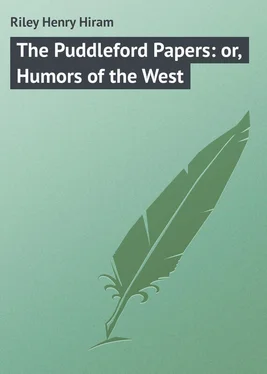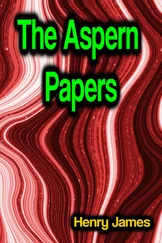Henry Riley - The Puddleford Papers - or, Humors of the West
Здесь есть возможность читать онлайн «Henry Riley - The Puddleford Papers - or, Humors of the West» — ознакомительный отрывок электронной книги совершенно бесплатно, а после прочтения отрывка купить полную версию. В некоторых случаях можно слушать аудио, скачать через торрент в формате fb2 и присутствует краткое содержание. Жанр: foreign_prose, foreign_humor, на английском языке. Описание произведения, (предисловие) а так же отзывы посетителей доступны на портале библиотеки ЛибКат.
- Название:The Puddleford Papers: or, Humors of the West
- Автор:
- Жанр:
- Год:неизвестен
- ISBN:нет данных
- Рейтинг книги:3 / 5. Голосов: 1
-
Избранное:Добавить в избранное
- Отзывы:
-
Ваша оценка:
- 60
- 1
- 2
- 3
- 4
- 5
The Puddleford Papers: or, Humors of the West: краткое содержание, описание и аннотация
Предлагаем к чтению аннотацию, описание, краткое содержание или предисловие (зависит от того, что написал сам автор книги «The Puddleford Papers: or, Humors of the West»). Если вы не нашли необходимую информацию о книге — напишите в комментариях, мы постараемся отыскать её.
The Puddleford Papers: or, Humors of the West — читать онлайн ознакомительный отрывок
Ниже представлен текст книги, разбитый по страницам. Система сохранения места последней прочитанной страницы, позволяет с удобством читать онлайн бесплатно книгу «The Puddleford Papers: or, Humors of the West», без необходимости каждый раз заново искать на чём Вы остановились. Поставьте закладку, и сможете в любой момент перейти на страницу, на которой закончили чтение.
Интервал:
Закладка:
Then came an exhortation on duties ; and almost every practical virtue was mentioned and impressed. Early rising, industry, economy, modesty, contentment, etc., etc., all received a notice at his hands. "Don't sleep yourselves to death!" exclaimed Bigelow; "rise early! work! for while you sleep the Enemy will sow your fields full of tares; and the only way to keep him out is to be on the spot yourself !" This was a literal application of the parable, it is true; yet it was very well done, and productive, I have no doubt, of some good.
Bigelow closed in a most tempestuous manner. He was eloquent, sarcastic, and comical, by turns. He had taken off nearly all his clothes, except his pantaloons, shirt, and suspenders; a custom among a certain class of western preachers, however strange it may appear to many readers. Streams of perspiration were running down his face and neck; his hair was in confusion; and altogether, he presented the appearance of a man who had passed through some convulsion of nature, and barely escaped with his life.
I could not help thinking that Bigelow was entitled to great credit, not only for the matter his sermon contained, but in being able to deliver a sermon at all amid the confusion which often surrounded him. There were a dozen or more infants in the crowd, some crowing, some crying, and some chattering. One elderly lady, in particular, had in charge one of these responsibilities, that seemed to set the place and the preacher at defiance. She tried every expedient to quiet the little nuisance, but it was of "no use." She set it down, laid it down, turned it around, nursed it, chirped at it; and finally, giving up in despair, she placed it on her knee, the child roaring at the top of its lungs, and commenced trotting it in the very face of the audience. This operation cut up the music of the innocent, and threw it out in short, quick jerks, very agreeable to the preacher and congregation.
An excellent old woman also sat directly in front of Bigelow, her left elbow resting on her knee, which she swayed to and fro with a sigh. Her face lay devoutly in the palm of her hand, while her right thumb and fore-finger held a pinch of snuff, which she every now and then slowly breathed up a hawk-bill nose, with a long-drawn whistle, something after the sort that broke forth from the clarinet a while before. She then blew a blast into a faded cotton handkerchief, that reverberated like the voice of "many trumpets." This was followed by fits of coughing, and sneezing, and sighing; in fact, she sounded as great a variety of notes as the choir itself.
Besides all this, a troop of dogs who had followed their masters were continually marching up and down the chapel; and when any unusual excitement occurred with Bigelow, or any one else, as there did several times, we had a barking-chorus, which threatened to suspend the whole meeting. Bigelow, however, didn't mind any or all of these things; but, like a skilful engineer, he put on the more steam, and ran down every obstacle in his way.
Reader, I have given you a description of the log-chapel at Puddleford. It is like a thousand other places of public worship in a "new country." If there is something to condemn, there is more to praise. There seems to be a providence in this, as in all other things.
The settlers in a forest are a rough, hardy, and generally an honest race of men. It is their business to hew down the wilderness, and prepare the way for a different class who will surely follow them. They cannot cultivate their minds to any extent, or refine their characters. They must be reached through the pulpit by such means as will reach them. Of what importance is a nice theological distinction with them? Of what force a labored pulpit disquisition? They have great vices and strong virtues. Their vices must be smitten and scattered with a sledge-hammer; they are not to be played with in a flourish of rhetoric. Just such a human tornado as Bigelow is the man for the place; he may commit some mischief, but he will leave behind him a purer moral atmosphere and a serener sky.
Society, in such a place as Puddleford, is cultivated very much like its soil. Both lie in a state of rude nature, and both must be improved. The great "breaking-plough," with its dozen yoke of cattle, in the first place, goes tearing and groaning through the roots and grubs that lie twisted under it, just as Bigelow tore and groaned through the stupidity and wickedness of his hearers. Then comes the green grass, and wheat, and flowers, as years draw on; producing, at last, "some sixty, and some a hundred-fold."
There is something impressive in the Sabbath in the wilderness. A quiet breathes over the landscape that is almost overwhelming. In a city, the church-steeples talk to one another their lofty music; but there are no bells in the wilderness to mark the hours of worship. The only bell which is heard is rung by Memory, as the hour of prayer draws nigh; some village-bell, far away, that vibrated over the hills of our nativity, the tones of which we have carried away in our soul, and which are awakened by the solemnity of the day.
There is a philosophy in all this, if we will but see it; there is more; there is a lesson, possibly a reproof. If we are disposed to smile at the rusticity of a Puddleford church, may we not with equal reason become serious over the overgrown refinement of many another? May not something be learned in the very contrast which is thus afforded? Do not the extravagant hyperbole, coarse allusions, irreverent anecdote, and strong but unpolished shafts of sarcasm, that such as Bigelow so unsparingly scatter over the sanctuary, give a rich background and strong relief to the finished rhetoric of many a pulpit essay, that has been written to play with the fancy and tranquillize the nerves of a refined and fashionable audience? Are not the extremes equally ridiculous? the one not having reached, the other having passed the zenith.
CHAPTER V
Indian Summer. – Venison Styles again. – Jim Buzzard. – Fishing Excursion. – Muskrat City. – Indian Burying-ground. – The Pickerel and the Rest of the Fishes. – The Prairie. – Wild Geese. – The Old Mound. – Venison's Regrets at the degenerating Times. – His Luck, and Mine. – Reminiscences of the Beavers. – Camping out. – Safe Return.
Indian summer had not yet taken her bow from the woods or her breath from the sky. Old Autumn still lay asleep; Time stood by, with his hour-glass erect, slowly counting the palpitations of his heart.
Venison Styles appointed a day for a fishing excursion, and was desirous of my company; so, on one of those bright mornings, we might have been seen loading our gear into the boat, preparatory to a night's lodging in the woods. We were accompanied by "Jim Buzzard," a genuine Puddlefordian, whom we took along to do up the little pieces of drudgery that always attend such an expedition.
Puddleford was a wonderful place for fish-eaters, and the only real harvest the villagers had was the fish-harvest. One half of Puddleford lived on fish, and everybody fished. But our "Jim Buzzard" was a character in fish, and I could never excuse myself if I should pass him over unnoticed.
Where "Jim" was born – who was his father or mother – and whether he actually ever had any, are questions that no mortal man was ever yet able to answer. He appeared one spring morning in Puddleford with the swallows. The first thing seen of him, he was sitting, about sunrise, on an old dry goods' box, at the corner of a street, whistling a variety of lively airs. The crown was dangling from the top of his hat, he was shirtless and unshaved, and his shoes gaped horribly at the public.
"Jim" was a genuine loafer, and loafers, you know, reader, pervade every place, and are always the same. There is a certain class of animals that are said to follow civilization, as sharks follow in the wake of a ship, and generally for the same reason, to pick up what they can find. Rats and loafers belong to this class, and there is no human ingenuity shrewd enough to keep them off: their appearance seems to be a simple fulfilment of a law of nature.
Читать дальшеИнтервал:
Закладка:
Похожие книги на «The Puddleford Papers: or, Humors of the West»
Представляем Вашему вниманию похожие книги на «The Puddleford Papers: or, Humors of the West» списком для выбора. Мы отобрали схожую по названию и смыслу литературу в надежде предоставить читателям больше вариантов отыскать новые, интересные, ещё непрочитанные произведения.
Обсуждение, отзывы о книге «The Puddleford Papers: or, Humors of the West» и просто собственные мнения читателей. Оставьте ваши комментарии, напишите, что Вы думаете о произведении, его смысле или главных героях. Укажите что конкретно понравилось, а что нет, и почему Вы так считаете.












![O. Henry - Heart of the West [Annotated]](/books/745888/o-henry-heart-of-the-west-annotated-thumb.webp)